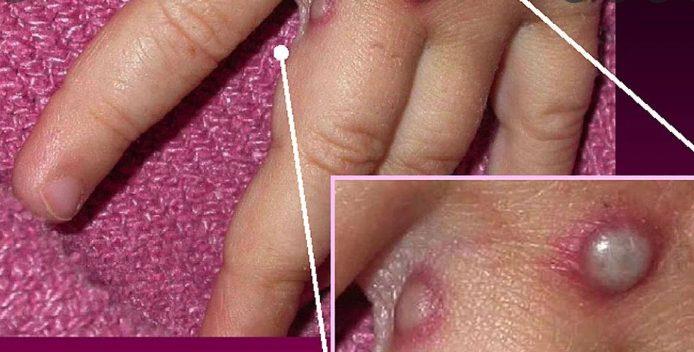
The Dangerous Parallel Between Monkeypox And AIDS
Experts have drawn parallels to the recent coverage of the monkeypox virus to initial reporting about the HIV/AIDs epidemic in the 1980s, warning that it will fuel stigma and jeopardize the response to the outbreak.
The United Nations AIDS agency (UNAIDS) said that“a significant proportion” of recent monkeypox cases have been identified among gay, bisexual, and other men who have sex with men.
But UNAIDS added that the World Health Organization (WHO ) has said that available evidence suggests those who are most at risk are people who have had close physical contact with someone with monkeypox, and that risk is not limited to men who have sex with men.
David Heymann, a leading advisor to WHO, said the recent cases appear to have gotten into the population through sexual contact . He told the Associated Press earlier this week that the leading theory to explain the recent spread was sexual transmission at raves held in Spain and Belgium.

Symptoms of one of the first known cases of the monkeypox virus are shown on a patient's hand. AIDS Activists Demonstrate in Midtown for more research dollars, blaming President Reagan for lack of funding, New York, New York, 1988. ALLAN TANNENBAUM/GETTY IMAGES
That has led to some reporting that monkeypox can only be passed through sexual contact. On Fox News , Jesse Waters called monkeypox a“sexually transmitted disease” that is“primarily passed through homosexual sex.”
But an expert on sexually transmitted diseases at WHO has emphasized that monkeypox is“not a gay disease” and that anyone can contract it through close contact.
According to the U.S. Centers for Disease Control and Prevention, monkeypox can infect people by entering the body through broken skin, the respiratory tract, or mucous membranes like the eyes, nose, or mouth. People can also catch it through direct contact with bodily fluids or lesion material.
The repercussions of labeling HIV a homosexual disease led to“untold suffering in gay communities in the 1980s who were blamed for the epidemic,” Boghuma K. Titanji, an infectious disease physician and virologist who focuses on people with HIV, and Keletso Makofane, a public health researcher who works on the global HIV response, noted in a recent blog post .
They wrote that cases were under-reported in the early days of the epidemic as those who contracted the virus“went underground” instead of seeking care.
“This resulted in many missed opportunities to quickly learn about the infection, understand its transmission and importantly, provide targeted public health interventions to curb its spread,” they said.“Instead, individuals in the group most affected at the time were blamed for their own suffering and ostracized as purveyors of disease.”
DaShawn Usher, of LGBTQ advocacy organization GLAAD, also warned of the danger of misinformation about monkeypox being amplified by the media.
“Health reporting should always lead with facts and science, and not single out groups of people based on who they are,” Usher told Newsweek. “As we learned with HIV and with COVID, misinformation spreads infection amongst groups that believe they are not at risk, leads to dangerous silencing and shaming, and harms public health.”
Usher said medical providers, researchers and the media“must do all they can to center the facts to protect everyone.”
Noting that GLAAD was founded in 1985 to ensure accurate and inclusive media coverage of people living with HIV, Usher added:“We shouldn't have to relearn the same lessons about misinformation and stigma to stop outbreaks before they spread.”
UNAIDS also urged media and others to respond with a“rights-based, evidence-based approach that avoids stigma.”
“Stigma and blame undermine trust and capacity to respond effectively during outbreaks like this one,” the agency's deputy executive director, Matthew Kavanagh, said in a statement on Sunday.“Experience shows that stigmatizing rhetoric can quickly disable evidence-based response by stoking cycles of fear, driving people away from health services, impeding efforts to identify cases, and encouraging ineffective, punitive measures.”
“We appreciate the LGBTI community for having led the way on raising awareness—and we reiterate that this disease can affect anyone,” he said.
Kavanagh said the outbreak“highlights the urgent need for leaders to strengthen pandemic prevention, including building stronger community-led capacity and human rights infrastructure to support effective and non-stigmatizing responses to outbreaks.”
He added:“Stigma hurts everyone. Shared science and social solidarity help everyone.”
Monkeypox is endemic in a number of African countries, according to WHO. But as of May 21, the organization said it has received reports of 92 laboratory-confirmed cases and 28 suspected cases from 12 member countries where the disease is not endemic, including the United States . WHO says reported cases so far have no established travel links to an endemic area.
BY KHALEDA RAHMAN
Newsweek
MENAFN25052022000207011051ID1104272118

Legal Disclaimer:
MENAFN provides the
information “as is” without warranty of any kind. We do not accept
any responsibility or liability for the accuracy, content, images,
videos, licenses, completeness, legality, or reliability of the information
contained in this article. If you have any complaints or copyright
issues related to this article, kindly contact the provider above.


















Comments
No comment